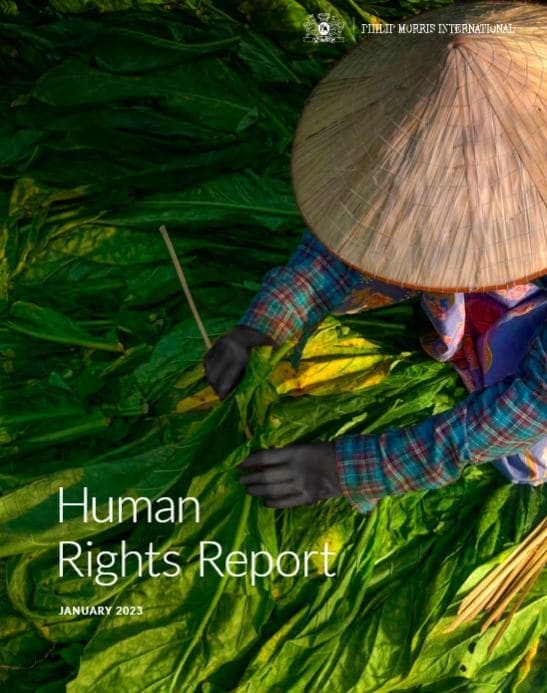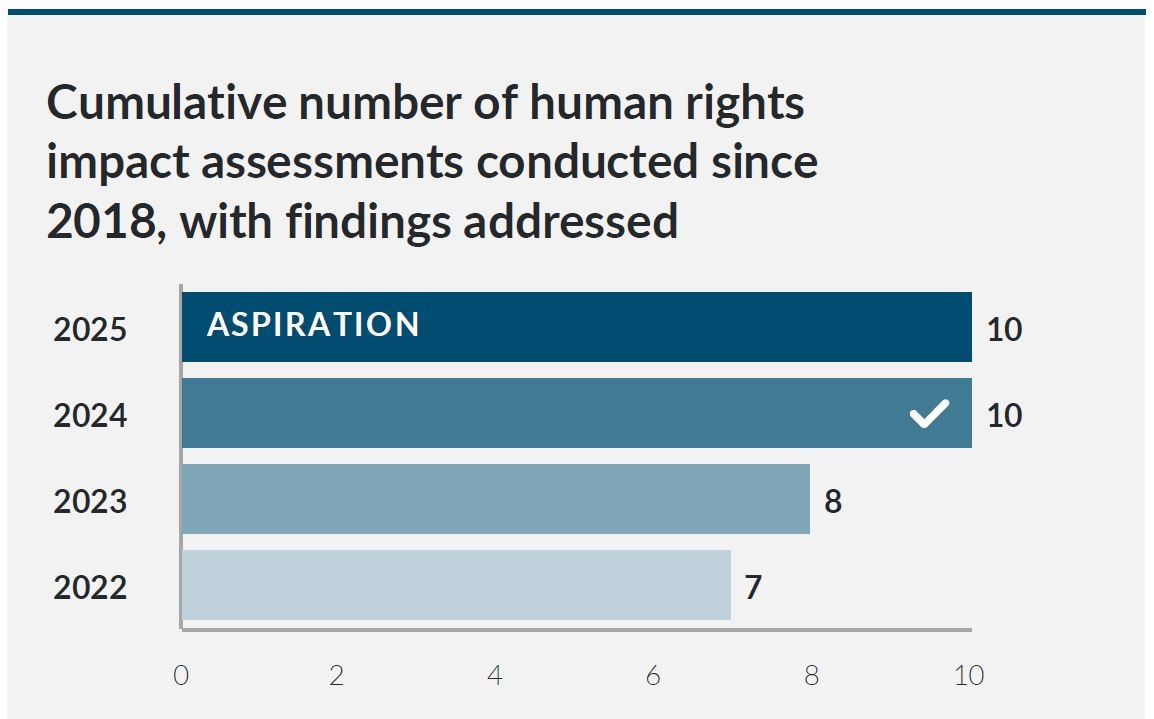At PMI, promoting, protecting, and continuously working to embed human rights considerations into our company’s strategy, policies, and business practices is not just the right thing to do; it also helps anticipate current and emerging legal requirements and minimizes our financial exposure and the risk of supply chain disruptions. It creates the basic environment and conditions within which our business can thrive and create value, by recognizing, respecting, and protecting our rights-holders, including our employees and workers across our value chain.
Our approach
Across our value chain, we aim to minimize our adverse impacts and maximize opportunities to drive positive change. Establishing a strong foundation of respect and integrating into our organization mechanisms that promote and protect human rights are essential components of our approach to business. While maintaining these high standards can be challenging given the breadth of our operations and the scope and complexity of the issues we encounter, we believe safeguarding human rights is an absolute and universal requirement—which we are committed to upholding.
We seek to place rights-holders—those individuals and communities whose rights could be impacted by our operations or business relationships—at the center of all we do. We work to continuously improve our due diligence with respect to identifying and addressing current or potential risks and impacts across our value chain and ensuring the responsible procurement of materials and services. To succeed in this endeavor, we expect our suppliers to commit to respecting human rights within their businesses and we seek to collaborate with them, either individually or through multistakeholder initiatives.
Our efforts to respect, promote, and protect human rights underlie many of the activities and programs described throughout this report. A dedicated cross-functional team at our central operations coordinates our approach, which is grounded in the United Nations Guiding Principles on Business and Human Rights (UNGPs) and centered on four pillars:
A sound policy framework: Our work is governed by PMI’s Human Rights Commitment, which is complemented by other PMI policy instruments such as our Code of Conduct, Responsible Sourcing Principles, Marketing Codes, and Good Agricultural Practices. Awareness-raising and training help us embed those instruments and an ethos of respect for human rights within our corporate culture.
Rigorous due diligence: We have robust programs and processes in place to identify our adverse impacts across our value chain; these include our enterprise-wide assessment, human rights saliency mappings, and human rights impact assessments (HRIAs), in addition to targeted due diligence programs focused on specific areas of potential risk such as our tobacco and electronics supply chains. We complement these programs with external assessments and verifications.
Remediation: We implement measures to address adverse impacts and maximize opportunities to drive positive change for people across our value chain. We seek to collaborate with civil society organizations, governments, and the private sector to design and deploy impactful solutions. Wherever adverse impacts occur, we strive to ensure affected individuals have access to grievance mechanisms and effective remedies in line with the UNGPs.
Transparency: A complex and international value chain carries the potential for human rights risks that we need to understand, manage, and continuously address. Reporting transparently on our progress and the challenges we face through our annual reporting and targeted communications is vital to our approach.
Our Human Rights Report, published in 2023 and available for download here, details our strategy to respect, promote, and protect human rights and our progress to date in implementing our Human Rights Commitment, first published in 2017. This report incorporates a preliminary analysis of disclosures on our work on human rights and the considerations of the UN Guiding Principles Reporting Framework (UNGPRF), which enables companies to report meaningfully on their human rights performance.

PMI’s Human Rights Report
In 2023, we published our inaugural Human Rights Report, detailing our strategy to respect, promote, and protect human rights and our progress to date in implementing our Human Rights Commitment, first published in 2017. This report incorporates a preliminary analysis of disclosures on our work on human rights and considerations of the UN Guiding Principles Reporting Framework (UNGPRF), which enables companies to report meaningfully on their human rights performance.
Reinforcing our Human Rights Commitment
We uphold our Human Rights Commitment, which articulates our pledge to respect human rights in all our operations and business relationships.
To ensure knowledge and implementation of our Human Rights Commitment, we have included it in our company-wide Business and Human Rights e-learning which is available in multiple languages including Bahasa, English, German, Japanese, Polish, Portuguese,
Russian, and Spanish. These represent the most widely spoken languages by our workforce.
Advancing human rights through multi-stakeholder partnership
In line with PMI’s Human Rights Commitment and
Responsible Sourcing Principles, the Security &
Market Safety team was invited to collaborate with
the International Code of Conduct Association
(ICoCA).
ICoCA is a multistakeholder initiative formed in 2013 to ensure that providers of private security services respect human rights and humanitarian law. It serves as the governance and oversight mechanism of the International Code of Conduct for Private Security Service Providers.
Our engagement focused on ensuring all PMI Security & Market Safety personnel are trained on the human rights components applicable to security, specifically the prevention of misuse of force and appropriate working conditions for third-party security personnel deployed at PMI sites; and codifying these requirements as contractual obligations for key suppliers delivering security services.
Assessing human rights impacts across our markets
To strengthen our due diligence framework, proactively identify risks, and mitigate potential adverse impacts along our operations and value chain, we have set an ambition to conduct human rights impact assessments (HRIAs) by 2025 in the 10 highest-risk countries in which we operate. During 2024, as we completed our 9th and 10th assessment in Kazakhstan and Indonesia, respectively, we achieved our aspiration one year ahead of schedule. We also completed a follow-up assessment in Mozambique, gauging the progress made since our original assessment conducted in 2020. Our HRIAs are carried out by independent expert organizations and follow a formal process aligned with the UNGPs. They result in tailored action plans, which we implement, monitor, and report on.

Note: Our assessments prioritize countries which are assessed as highest risks from a human rights standpoint. They are determined based on key parameters such as PMI’s footprint and the country’s human rights risk profile, as determined by internationally recognized organizations. For further details, please see PMI’s Sustainability KPI Protocol 2024.
Regarding past HRIAs, action plans have been fully implemented in Malaysia, Mexico, the Philippines, and Russia. We also continued monitoring the implementation of actions developed in previous HRIAs in Turkey, Brazil and Pakistan.
In addition to conducting HRIAs in PMI’s highest-risk countries, we introduced a self-assessment tool in 2021, which we further fine-tuned in 2023, accounting for the inputs of our network of sustainability experts across our markets and our human rights consultant Article One. Streamlining the toolkit was welcomed by those who use it, and the revised version is less complex to use while also including practical supports to successfully aid conduct.
Conducting a gender-inclusive human rights impact assessment in Indonesia
Our affiliate in Indonesia has an extensive footprint with over 20,000 employees and seven manufacturing facilities across the country, as well as close to 40 upstream manufacturers and around 60,000 hand-rollers for conventional cigarettes.
Read the case study here.
Continuous reinforcement of our human rights framework
We periodically assess PMI’s human rights-related policies, procedures, and due diligence process against upcoming and emerging regulatory standards.
Strengthening human rights due diligence in our supply chain
We continue strengthening all our due diligence programs (through our ALP program in our agricultural supply chain, RBA in our electronics supply chain, and for our broader supply chain we use Ecovadis) to ensure that we identify potential and actual human rights impacts and build and deploy corrective action plans to address them (read more in the Managing our supply chain sustainably section of this report).
Conducting a human rights impact assessment in Kazakhstan
In 2024, we conducted a HRIA in Kazakhstan covering the head and regional offices, factory as well as downstream, third-party sales, distribution, and retail.
Read the case study here
Human rights saliency mapping
Our first company-wide saliency mapping was conducted in 2017. It was then refreshed in 2020 to reflect changes in the business in the context of rapid transformation and heightened understanding of human rights. We are now reviewing and updating our human rights saliency mapping once again, working with our human rights advisers, Article One, as part of our commitment and responsibility to respect human rights.
Grievance mechanisms
Providing access to remedy to potentially impacted stakeholders relies on the provision of an effective grievance mechanism, both for our operations and across our supply chain. This is a core element of our human rights due diligence approach, aligned with the UNGPs. At PMI, we maintain clear policies, run regular training, and work to ensure that robust processes are in place to encourage individuals to speak up if they become aware of any suspected, potential, or actual violations of law, our Code of Conduct, or any of our policies.
For more information on the grievance mechanisms we offer at PMI to encourage individuals to ask questions, raise concerns, or report instances of observed or suspected misconduct, see the Uphold business ethics and integrity section of this report.
Preparing for the EU Corporate Sustainability Due Diligence Directive
Under the EU Corporate Sustainability Due Diligence Directive (CSDDD), currently under review, large companies will be subject to a corporate due diligence duty requiring them to identify, address, and where relevant remediate adverse human rights impacts (such as child labor) and environmental impacts (such as pollution) in their own operations, their subsidiaries, and business partners. At PMI, we started preparing for CSDDD, and will continue to do so, strengthening our current due diligence approach and integrating it into our policies and risk management systems.
This online content about our Integrated Report should be read in conjunction with PMI’s Integrated Report 2024. This report includes metrics that are subject to uncertainties due to inherent limitations in the nature and methods for data collection and measurement. The precision of different collection and measurement techniques may also vary. This report includes data or information obtained from external sources or third parties. Unless otherwise indicated, the data contained herein cover our operations worldwide for the full calendar year 2024 or reflect the status as of December 31, 2024. Where not specified, data comes from PMI financials, nonfinancials, or estimates.
Unless explicitly stated, the data, information, and aspirations in this report do not incorporate PMI’s wellness and healthcare business, Aspeya. Regarding the Swedish Match acquisition, completed late 2022, unless otherwise indicated, this report includes information pertaining to its sustainability performance. Please also refer to "This report at a glance" on page 2 of the PMI’s Integrated Report 2024 for more information. Aspirational targets and goals do not constitute financial projections, and achievement of future results is subject to risks, uncertainties and inaccurate assumptions, as outlined in our forward-looking and cautionary statements on page 206. In PMI’s Integrated Report 2024 and in related communications, the terms “materiality,” “material,” and similar terms are defined in the referenced sustainability standards and are not meant to correspond to the concept of materiality under the U.S. securities laws and/or disclosures required by the U.S. Securities and Exchange Commission.


